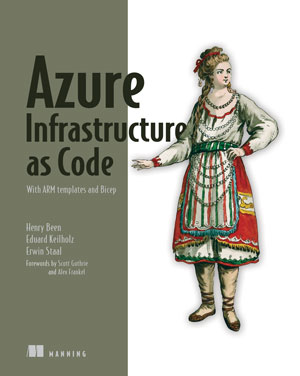
出版时间:2022.6
官网链接:Manning
下载地址:百度网盘(truePDF+EPUB+MOBI)
内容简介:
Master ARM templates, Bicep, and other Azure Infrastructure-as-Code tools, techniques, and practices to build infrastructure on the Azure cloud.
In Azure Infrastructure as Code you will learn how to:
- Create reusable infrastructure templates using advanced features of the ARM (Azure Resource Manager) syntax
- Write templates with the Azure Bicep domain-specific language (DSL)
- Test ARM and Bicep templates
- Deploy templates using deployment pipelines
- Guarantee repeated outcomes when you reuse templates to replicate infrastructure
- Share templates between teams
- Provision templates to provide standards and Azure Policy to enforce them
- Orchestrate complex deployments using Azure DevOps and GitHub Actions
- Pre-provision environments for other teams with deployment stacks
Azure Infrastructure as Code teaches you to use Azure’s native infrastructure as code (IaC) tools, like ARM and Bicep, to build, manage, and scale infrastructure with just a few lines of code. You’ll discover ARM templates, deployment stacks, and the powerful new language Bicep. See how easy they make it to create new environments, safely make infrastructure changes, govern your resources using Azure Policy, and prevent configuration drift. Loaded with in-depth coverage of syntax and lots of illustrative examples, this hands-on guide is a must-read for anyone looking to expand their knowledge of provisioning.
about the technology
Automating tasks like provisioning servers, operating systems, and storage, saves time and radically increases consistency. The Infrastructure as Code (IaC) approach brings the tools and practices of application deployment, such as Github Actions, automated testing, and pipeline-driven deployments, to infrastructure components. With Azure’s native IaC tools, you can create whole new infrastructures with just a few lines of code using declarative specifications and an intuitive domain-specific language.
about the book
Azure Infrastructure as Code shows you how to manage and automate your infrastructure using Azure’s IaC tools. In this practical guide, you’ll discover how to set up Azure Resource Manager (ARM) templates and to script infrastructure creation using the Bicep DSL. You’ll also explore advanced topics such as testing, reusing templates, and defining policies as code. You’ll even build a complete CI/CD pipeline that can orchestrate a complex infrastructure deployment across multiple regions.
what’s inside
- Create reusable infrastructure templates
- Write templates with the Azure Bicep domain-specific language
- Deploy templates using deployment pipelines
- Share templates between teams
about the reader
For operations, infrastructure, or software engineers with some Azure experience.
about the authors
Henry Been is a freelance DevOps and Azure architect and consultant. Erwin Staal is an Azure architect and DevOps consultant. Eduard Keilholz is a cloud solution architect.